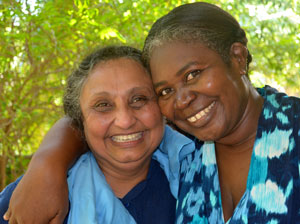 A Mission Co-worker’s Journey
A Mission Co-worker’s Journey
Growing Food and Friendships in Haiti
Mission trip and new roundtable conversations lead to transformation.
By Cindy Corell
Our group of six Americans and a couple of Haitians trooped carefully across the field where we admired Roma tomato plants, laden with their ripe, red fruit.
Greeting us in the garden was Rosana Thelusma, smiling as if she’d waited for our visit for a long time.
Fabienne Jean—coordinator of the Presbyterian Hunger Program’s Joining Hands network in Haiti—and I, the network’s companionship facilitator, had brought the delegation from the Presbytery of the James in Virginia to visit partners in the area.
Jean’s job is to run the operations of our network.
My job is to be a liaison with our partners in the United States and to facilitate friendships.
On this February trip, I saw all our work in action!
Our network, FONDAMA (Creole acronym for the Hands Together Foundation of Haiti), includes 11 grassroots organizations addressing the root causes of poverty.
Each year, FONDAMA identifies one issue for an advocacy campaign. In 2016, the issue is the importation of foreign food that harms the local farmers’ ability to profit from their work.
Thelusma is a trainer for the organization MULAC (Creole acronym for Hands United for the Liberation and Advancement of the Community). She not only has a productive garden, but she also teaches others to grow food.
While we admired the lush garden, and while Thelusma explained through a translator the challenges and triumphs, one member of our group especially was excited.
“I need you to come to Virginia to help me,” Aruna Ratnavibhushana told Thelusma. “But I would be embarrassed. My garden doesn’t look anything like this!”
We went onto the roof of Thelusma’s house to see where the organization has planted vegetables in tires. This method—turning old automobile tires inside out and filling them with compost and soil—requires much less water than traditional gardening.
More tomatoes, cabbage, spinach, peppers, and beets grew in the rooftop garden. After descending the stairs to the porch, Thelusma and others served us ice-cold lime juice.
Ours was not the traditional “mission trip.” We made deep connections. Language was a barrier, but not our smiles. And when Ratnavibhushana and Thelusma embraced for a photo, we could see that in God’s garden we all grow together.
Of course, our work goes much deeper than admiring healthy gardens. Our work requires that we continue paying attention to the obstacles facing Haitian farmers.
The food imports are one such obstacle. The oft-threatened exposure to genetically modified seeds is another. So are land grabs, in which small stakeholder farmers lose their land to corporate interests.
Two weeks after the February trip, Ratnavibhushana participated in a webinar arranged by the Presbyterian Hunger Program about the dangers of GMO seeds.
The webinar is one of the monthly features of the Hunger Program-led roundtables, where experts in partner countries and Presbyterians in the United States can share information about issues affecting people living in poverty. The roundtables specialize in food and land issues, extractives, and climate and trade justice.
After journeying to visit our brothers and sisters in Haiti, Ratnavibhushana continued with that next step—joining the conversation to learn, share, and, in time, break the bonds of poverty around the world.
Now that’s what I call friendship!
Cindy Corell is a PC(USA) mission co-worker in Haiti and a former journalist.


